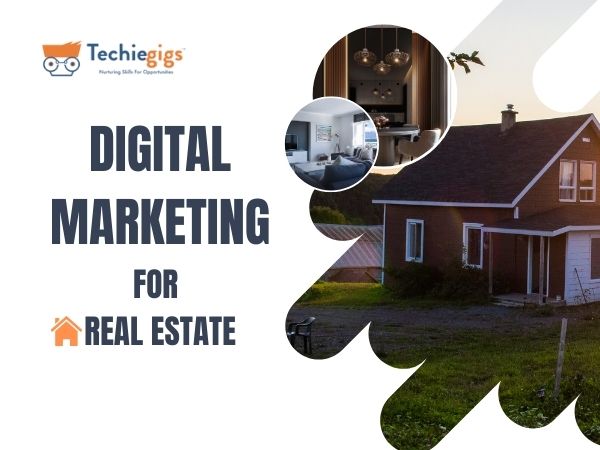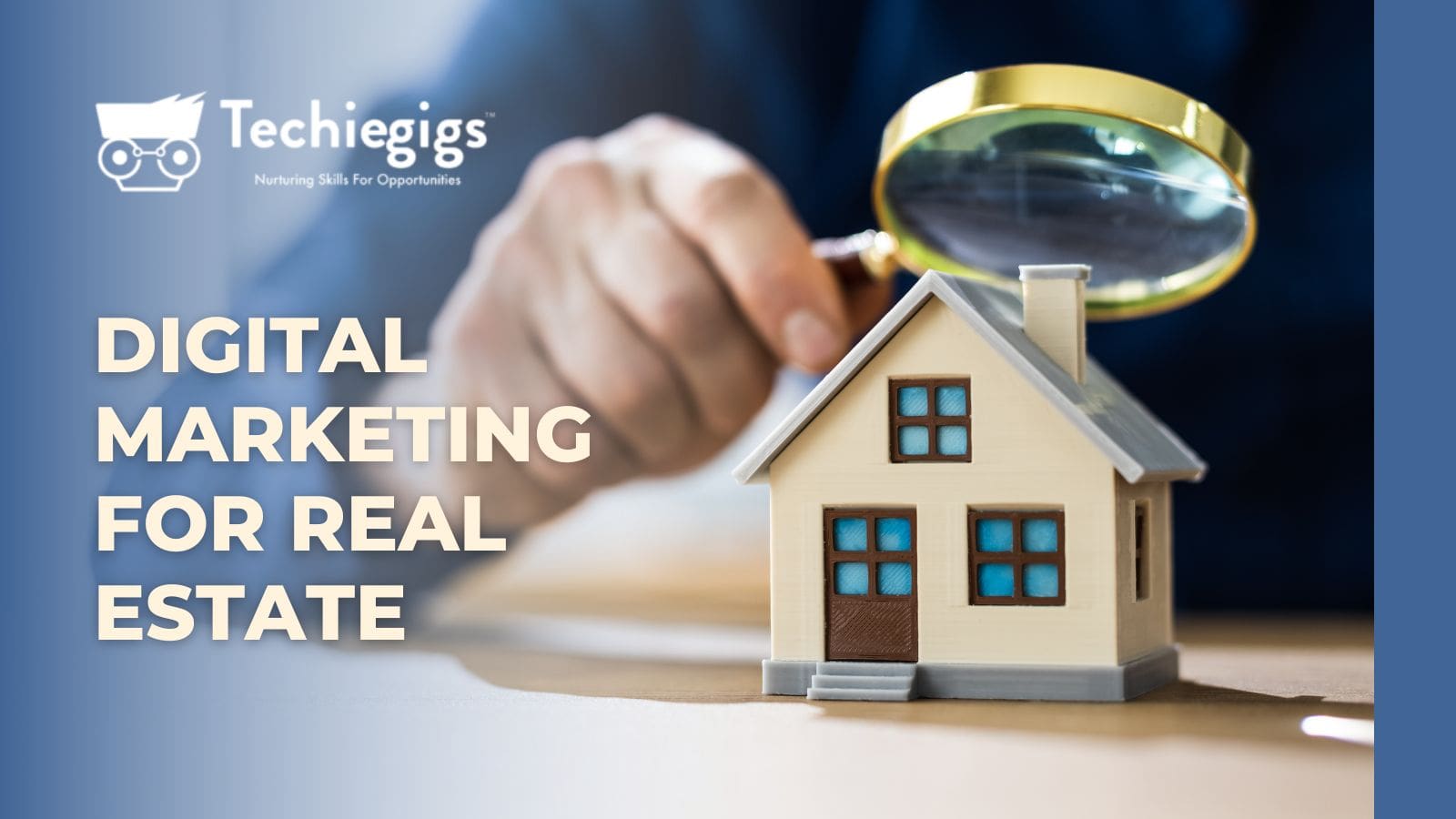Digital Marketing for real estate has become essential in the current digital era as industries increasingly use the internet to connect with their target audience. While traditional marketing methods like print advertisements and billboards still have their place, the future of real estate marketing lies in digital strategies. These approaches enable real estate companies to reach a broader audience and enhance the effectiveness and efficiency of their marketing campaigns.
If you are a real estate agent or developer trying to improve your online presence and increase sales, this blog will walk you through the most efficient real estate digital marketing tactics. In order to help you thrive in the cutthroat real estate market of today, we’ll go over SEO, social media marketing, sponsored ads, content marketing, and other tactics.
Why Digital Marketing for Real Estate is Essential

The internet has transformed how people find properties. According to studies, 93% of all house purchasers start their search online. Indeed, real estate purchasers spend more time investigating houses online than in person. This figure clearly shows that real estate brokers who do not have a solid digital marketing plan risk losing a large portion of their potential clients.
Furthermore, internet marketing enables real estate brokers to precisely target their ideal clientele, something traditional marketing tactics could never accomplish. With a well-rounded digital marketing strategy, you can boost company exposure, create quality leads, and complete sales faster.
Key Strategies of Digital Marketing for Real Estate
Let’s dive into the most effective digital marketing strategies that will help you dominate the real estate market online.
1. Search Engine Optimization (SEO)
SEO is an essential component of digital marketing for real estate. SEO for real estate guarantees that your website appears high in search engine results pages (SERPs) when potential clients look for properties or related services.
Here’s how to use SEO for real estate:
- Keyword Research: Before you begin optimizing your content, you need determine the keywords that your target audience is searching for. Focus on long-tail keywords relevant to your target market, such as “buy homes in [location]” or “best real estate agents in [city].” Google Keyword Planner, Ahrefs, and SEMrush may all help you find high-volume, low-competition keywords.
- On-Page Optimization: Make sure your website’s pages are optimized for search engines. This includes:
Using keywords wisely in titles, meta descriptions, headers, and throughout your content.
Ensure that your website is mobile-friendly, as a substantial percentage of property searches are conducted on smartphones.
Images are optimized with alt text and compressed to speed up page load times.
- Local SEO: Real estate is very local, thus it’s critical to optimize for local SEO. Create a Google My Business profile, include location-specific keywords, and promote client reviews. This increases your chances of appearing in the local “3-Pack,” a group of local firms that show at the top of Google search results.
- Content Creation: Regularly produce high-quality content that addresses your target audience’s pain concerns. This might include blog pieces about buying or selling real estate, market trends, or home remodeling tips. SEO-optimized content may help you rank higher and establish yourself as a real estate authority.
2. Social Media Marketing

Social media marketing plays a pivotal role in digital marketing for real estate. Real estate brokers have the ideal opportunity to engage with potential clients using platforms such as Facebook, Instagram, LinkedIn, and YouTube.
- Facebook: Facebook is one of the largest social platforms, and it’s a great place to showcase properties, post updates, and run targeted ads. You may set up a company page to interact with fans, contribute blog entries, and even organize live Q&A sessions.
- Instagram: Instagram is ideal for real estate marketing due to its visual aspect. Post top-notch images and videos of properties, along with virtual tours and behind-the-scenes looks at the buying process. Instagram Stories and Reels are other effective ways to communicate with your audience and highlight new listings.
- LinkedIn: LinkedIn is a business-oriented platform that is great for interacting with other real estate professionals. It is a platform where you can establish your professional identity, distribute thought leadership pieces, and communicate with potential clients in a more formal setting.
- YouTube: Video marketing is an important aspect of digital marketing for real estate. Creating property tours, testimonials, and informative films about the home-buying process may boost engagement and traffic to your site.
When you create social media posts, always use relevant hashtags to increase the discoverability of your content. You should also engage with your audience by responding to comments and messages promptly.
3. Paid Advertising (PPC)
While SEO is a long-term approach, sponsored advertisements may provide you with rapid visibility for your real estate firm. Pay-Per-Click (PPC) advertising is an efficient method for driving targeted visitors to your website.
- Google Ads: Running Google Ads campaigns for certain real estate keywords can help your company rank at the top of search results. You may target customers who are actively looking for houses or other services in your region.
- Facebook and Instagram Ads: These platforms offer highly granular targeting options. You can create ads that target individuals according to their behavior, age, location, and interests. This guarantees that your advertisements reach the most appropriate audience. Facebook and Instagram also allow you to build dynamic advertising that display properties that consumers are likely to be interested in.
- Retargeting advertisements: If someone visits your website but does not complete a form or contact you, retargeting advertisements might remind them of your offerings. These advertisements show across a variety of websites and social media channels, boosting the possibility of a potential client returning and converting.
4. Email Marketing

Email marketing remains one of the most effective strategy of digital marketing for real estate. It allows you to interact with both current and potential customers, building relationships and guiding them through the decision-making process.
- Newsletters: Sending out regular newsletters with new listings, market information, and buying and selling recommendations will help keep your audience interested. Make sure your emails are visually appealing and include strong calls-to-action (CTAs) to increase clicks.
- Lead Nurturing: Create automated email sequences to nurture leads over time. For example, you might send a series of emails guiding a potential homebuyer through the steps of locating a property, obtaining financing, and finalizing the transaction. The idea is to deliver value and establish trust with your audience.
5. Content Marketing
Content marketing is an essential component of any effective plan for the digital marketing for real estate. By writing high-quality, educational material, you may establish yourself as a real estate expert and get leads naturally.
- Blogging: Start a blog on your website and publish posts regularly. Focus on issues that are important to your target audience, such as “How to Find the Perfect Family Home” or “The Best Neighborhoods in [City].” These sorts of postings are likely to rank well in search results and add value to your readers.
- Ebooks and Guides: Providing free materials such as ebooks, buyer guides, and industry studies will help you grow your email list and acquire leads. People are more willing to offer their contact information in exchange for useful material.
- Video Content: As mentioned earlier, video content is becoming increasingly important in real estate marketing. You may make property tours, client testimonials, and even instructive movies about home staging and market trends. These films not only engage your viewers, but they also boost your SEO efforts.
6. Website Optimization and User Experience
The foundation of your digital marketing strategy is your website, so it’s critical to make sure it’s search engine and user optimized.
- Fast Load Times: Websites that load quickly provide a better user experience and are favored by Google in search rankings. To guarantee a quick and responsive website, compress pictures, enable caching, and use a reputable web host.
- Mobile Optimization: As more consumers use mobile devices to search for properties, make sure your website is mobile-friendly. This entails creating a responsive design that adapts to multiple screen sizes and provides a smooth surfing experience.
- Clear Calls to Action: Your website should provide clear CTAs that direct users through the buying process. Whether it’s arranging a property tour, asking additional information, or contacting you, your CTAs should be simple to identify and execute.
Conclusion
Digital marketing for real estate is no longer a choice; it has become a need. You can improve your online presence, interact with more prospective buyers, and eventually close more sales by using the correct digital marketing methods. Having a comprehensive strategy that aligns with your objectives and target audience is essential, regardless of whether you prioritize SEO, social media, paid advertising, or content marketing.
You’ll be well on your way to being a digital marketing powerhouse in the real estate industry by combining these strategies and staying up to date with market developments. Start improving your website, interacting with your followers on social media, and creating excellent content that will drive traffic. Real estate marketing’s future is digital, and with the correct strategy, you can unleash unlimited potential.



